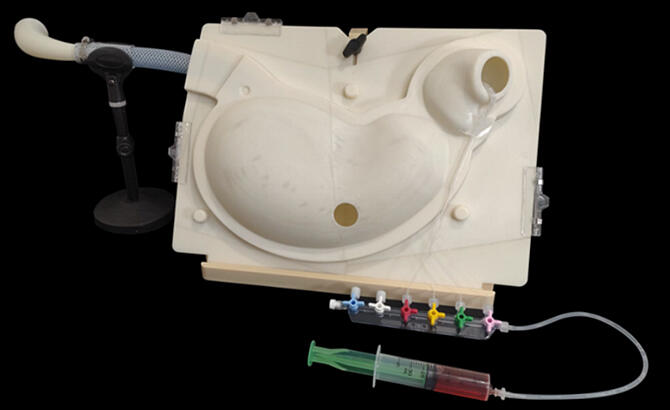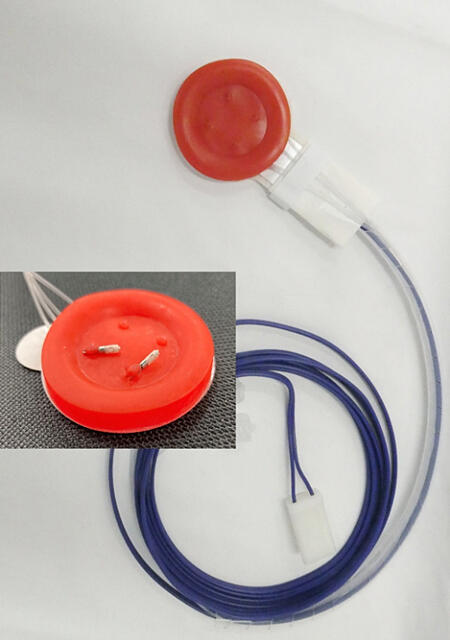Denka Company Limited collaborated with Associate Professor Takeshi Kanno and Professor Atsushi Masamune of the Graduate School of Medicine, and Assistant Professor Yutaro Arata of the Clinical Skills Laboratory at Tohoku University to develop a novel simulator that allows doctors to learn endoscopic hemostasis (using a clip and cauterization method with hemostatic grasper). The device concurrently uses actual endoscopes and treatment tools to provide treatment. The test sales (all completely custom-made) started on May 1, 2023. The simulator was the first product in the Medical Rising STAR project, through which Denka aims to foster the development of medical technology in Japan and overseas.


(Below) The ulcer model before versus after hemostasis. Learning is facilitated using the ulcer model inside the simulator lumen.
(both provided by Denka).
For inexperienced doctors, observation under actual operation was historically the only route by which basic endoscopy techniques could be learned. The development of a simulator that reproduces such procedures has long been anticipated, but until now, gastrointestinal bleeding was reproducible only in a live animal stomach, such as that of a pig.
Kanno reported that the number of bleeding ulcers in Miyagi Prefecture increased 2.2-fold after the 2011 Great East Japan earthquake and that many patients required emergency treatment within 1 month after it. To address the urgent need to train higher-level endoscopists, Kanno and Denka collaborated to develop the simulator. The simulator bases the lumen (stomach) on three-dimensional human data. Denka created an ulcer model using a special soft material through which a simulated blood vessel passes that realistically reproduces the sensations of the procedure.
Because the ulcer model can be freely positioned, the simulator can be used by both inexperienced and expert doctors to learn and maintain their highly technical endoscopy skills. The selection of bleeding vessel and amount are controllable and spurting bleeding (Forrest Ia) can be reproduced using a manual syringe control.
The lumen part of the simulator is reusable, requiring the replacement of only disposable components, such as the ulcer model. Assembly is easy and requires no special equipment.
In a calm setting under instructor guidance, the learner can experience endoscopic hemostasis using an actual endoscope and therapeutic devices in the simulator. The simulator helps learners safely improve their skills without risking patient safety.
The results of the joint development were published in the official video journal—VideoGIE—of the American Gastroenterological Endoscopy Society on November 29, 2022. It is possible to confirm endoscopist competence using the simulator.
Denka will continue to collaborate with Kanno to develop and expand the endoscopic procedure simulator for the gastrointestinal tract as part of the Medical Rising STAR project. The price is negotiable.
<Inquiries>
Life Innovation Division, New Business Exploration Department, Denka Company Limited.;
Tel: 03-5290-5674; E-mail: corporate-info@denka.co.jp
Journal Information
Publication: VideoGIE
Title: Novel simulator of endoscopic hemostasis with actual endoscope and devices
DOI: 10.1016/j.vgie.2022.10.004
This article has been translated by JST with permission from The Science News Ltd. (https://sci-news.co.jp/). Unauthorized reproduction of the article and photographs is prohibited.




